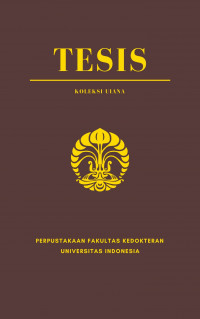Tesis
Kebutuhan Layanan Day Hospital Care bagi Lansia dengan Demensia Ringan – Sedang di Rumah Sakit Khusus Daerah Duren Sawit Jakarta = The Need of Day Hospital Care Services for the Person with Mild to Moderate Dementia at Rumah Sakit Khusus Daerah Duren Sawit Jakarta.
Latar Belakang: Penduduk lanjut usia (lansia) terus mengalami peningkatan seiring kemajuan di bidang kesehatan yang ditandai dengan meningkatnya angka harapan hidup, menurunnya angka kematian dan jumlah orang dengan demensia (ODD) yang juga cenderung bertambah. Masalah kesehatan jiwa ini kurang teridentifikasi oleh para tenaga kesehatan dan lansia itu sendiri. Oleh karena itu penting dilakukan identifikasi dan penilaian kebutuhan yang tidak terpenuhi (unmet needs) bagi para lansia dengan demensia khususnya demensia ringan hingga sedang. Kebutuhan yang tidak terpenuhi (unmet needs) yang sudah teridentifikasi disertai dengan persepsi dan harapan para lansia akan menjadi masukan positif dalam merancang program layanan day hospital care. Metode: Penelitian ini menggunakan mixed method design. Penelitian tahap pertama adalah penelitian kuantitatif dengan menggunakan instrumen CANE (Camberwell Assessment of Need for the Elderly) untuk menilai kebutuhan yang tidak terpenuhi (unmet needs) pada lansia dengan Demensia ringan – sedang. Penelitian tahap kedua adalah penelitian kualitatif dengan menggunakan metode Delphi yang dilaksanakan dalam dua putaran dan melibatkan sembilan ahli yang berprofesi dan berkecimpung menangani lansia. Putaran pertama dengan menggunakan kuesioner berisi open-ended question yang dituangkan dari berbagai referensi menghasilkan rancangan konsep awal isi materi modul. Putaran kedua merupakan pengembangan isi materi modul dengan menggunakan kuesioner empat skala Likert. Hasil putaran kedua dianalisis dengan menilai median dan Interquartile Range (IR) untuk menghasilkan konsensus para ahli sehingga modul layanan Day Hospital Care terbentuk. Hasil: Dari penelitian tahap pertama didapatkan lima proporsi unmet needs terbesar, yaitu pertemanan (26,0%), distres psikologis (20,8%), relasi akrab (19,8%), daya ingat (16,7%), dan kegiatan harian (10,4%). Dari putaran pertama metode Delphi diperoleh masukan dari para ahli untuk pengembangan isi materi yang terdapat dalam rancangan konsep awal modul. Hasil putaran kedua dari analisis skala Likert ditemukan adanya konsensus di antara para ahli bahwa isi materi yang tercantum dalam modul telah sesuai dengan target yang ingin dicapai dalam setiap bagian (bagian awal, bagian tengah, dan bagian akhir) dalam modul. Simpulan: Pembuatan modul layanan Day Hospital Care ini melalui dua tahap penelitian yaitu penelitian kuantitatif dan penelitian kualitatif sehingga menghasilkan suatu modul yang terstruktur, yang berisikan materi yang telah sesuai dalam setiap bagian dengan target yang akan dicapai.
Kata kunci: lansia; demensia ringan-sedang; unmet needs; modul; Day Hospital Care.
Background: The number of elderly population continues to increase as the advancement in healthcare grows, which is shown by the increase of life expectancy, the declining mortality rates, and the surge of people with dementia (PwD). This mental health issue is barely identifiable by health workers and the elderly themselves. Therefore it is important to evaluate and identify the unmet need of the people with dementia, especially mild to moderate dementia. The unmet needs that have been identified along with the perceptions and expectations of the elderlies will be positive inputs in designing the Day Hospital Care Service program. Methods: This study uses the mixed method design. The first phase is a quantitative research which utilizes CANE (Camberwell Assessment of Need for the Elderly) instrument to assess the unmet needs of the elderlies with mild to moderate dementia. The second phase is a qualitative research which utilizes the Delphi method that is done in two rounds and involves nine experts who worked with the elderlies. The first round uses a questioner with open-ended questions from various references that assembles an early concept of the module’s contents. The second round is about the development phase of the module’s contents which uses the four scale Likert questionnnaire. The outcome from the second round is analyzed by assessing the median and Interquartile Range (IR) to generate a consensus by the experts so that the Day Hospital Care service module is established. Results: The first phase of the research procured five substantial unmet needs proportion, which are friendship (26.0%), psychological distress (20.8%), close relations (19.8%), memory dysfunction (16.7%), and daily activities (10.4%). The first round uses the Delphi method which procures insight from experts to develop the early concept of the module’s contents. The results of the second round from the Likert scale, resulting a consensus among the experts regarding the contents that is written in the module are in accordance with the targets to be achieved in each section (the beginning, the middle, and the end) of the module. Conclusion: The production of The Day Hospital Care Service module requires a two phase research which are quantitative and qualitative research, hence producing a module that is well-structured, which contains materials that has been accurate in every section with a goal to be achieved.
Keywords: elderly; mild-moderate dementia; unmet needs; module; Day Hospital Care.
- Judul Seri
-
-
- Tahun Terbit
-
2022
- Pengarang
-
Tiur Sihombing - Nama Orang
Profitasari Kusumaningrum - Nama Orang
Martina Wiwie S. Nasrun - Nama Orang - No. Panggil
-
T22140fk
- Penerbit
- Jakarta : Sp-2 Ilmu Kesehatan Jiwa., 2022
- Deskripsi Fisik
-
xiii, 131 hal; ill; 21 x 30 cm
- Bahasa
-
Indonesia
- ISBN/ISSN
-
-
- Klasifikasi
-
NONE
- Edisi
-
-
- Subjek
- Info Detail Spesifik
-
Tanpa Hardcopy
| T22140fk | T22140fk | Perpustakaan FKUI | Tersedia |


Masuk ke area anggota untuk memberikan review tentang koleksi